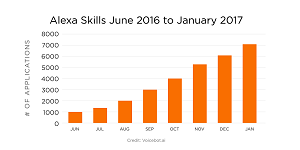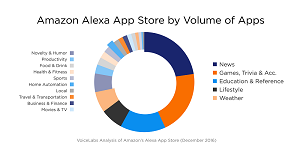News
Amazon Entices Alexa Voice Skills Developers with AWS Usage Credits
- By David Ramel
- March 15, 2017
Although cutting-edge development in areas such as voice-activated devices and speech-based natural user interfaces can be an exciting way to learn the new technologies, the area hasn't exactly paid off well for adventuresome coders.
"This is a large and growing market, and both Google Home and Amazon Echo will be huge business successes," said a January research report from VoiceLabs, which provides "voice experience analytics." However, that optimistic prediction comes with a caveat: "As of this report, no [voice-first] application has successfully monetized. By Q2, 2017, we predict one of the major platforms will deploy a compelling monetization method."
Amazon today announced it's at least proceeding in that direction, if not yet fulfilling that prediction. The company is awarding $100 promotional credits to developers who publish Alexa skills, which provide natural language commands to voice-controlled home computing devices such as Echo.
Monthly credits will be available for developers who use the Amazon Web Services Inc. (AWS) free tier to publish Alexa skills and subsequently exceed the limits of that program and thus incur usage fees.
 [Click on image for larger view.]
The Growth in Alexa Skills (source: Voicebot)
[Click on image for larger view.]
The Growth in Alexa Skills (source: Voicebot)
The AWS free tier offers 1 million AWS Lambda requests and up to 750 hours of Amazon Elastic Compute Cloud (Amazon EC2) compute time per month for no charge.
If a developer creates a skill -- say, to play a song, answer a question or control smart home devices -- that becomes so popular that regular usage charges kick in, AWS will e-mail a $100 promotional credit in the middle of the next month, good for the remainder of that month.
Also, all developers who publish a live Alexa skill will be eligible for a $100 credit, good for one year.
Voicebot, which tracks and reports on voice-first technology, applauded the move as least a step in the right direction to making money for coders. "Developers are giving their time to Alexa already and the AWS costs make it more difficult to justify without line of sight to monetization," the company said. "Amazon made a smart move to help support its growing developer community but it is at best a stopgap. A clear monetization model will be an important development later this year for both developers and consumers that want a great Alexa experience."
 [Click on image for larger view.]
The Mix of Alexa Apps (source: VoiceLabs)
[Click on image for larger view.]
The Mix of Alexa Apps (source: VoiceLabs)
Amazon, for its part, suggested the promotional campaign will spur more development. "There is already a large community of incredibly engaged developers building skills for Alexa," said exec Steve Rabuchin today in a statement. "Today, we're excited to announce a new program that will free up developers to create more robust and unique skills that can take advantage of AWS services. We can't wait to see what developers create for Alexa."
Amazon indicated the program would benefit developers who see varying levels of usage for their published skills, such as the Hurricane Center skill that leverages AWS Lambda to provide storm information to users. "Now, if my skill sees extensive use during hurricane season, I can be assured that those scalable costs will be covered with this new program," Amazon quoted the service's creator, Terren Peterson, as saying. "It puts my mind at ease and allows me to help more individuals be prepared for storms."
The Alexa development program provides a free SDK called the Alexa Skills Kit (self-service APIs, tools, documentation and code samples) that leverages the Alexa Voice Service to bring voice capabilities to connected devices.
By leveraging machine learning (ML), the Alexa skills service continually adapts to user input and gets "smarter," Amazon said. The company characterized the program as a good way for developers to get started early with ML and other cutting-edge technologies, such as speech-based natural user interfaces.
Coders can visit the Amazon developer site to apply for the program.
About the Author
David Ramel is an editor and writer at Converge 360.